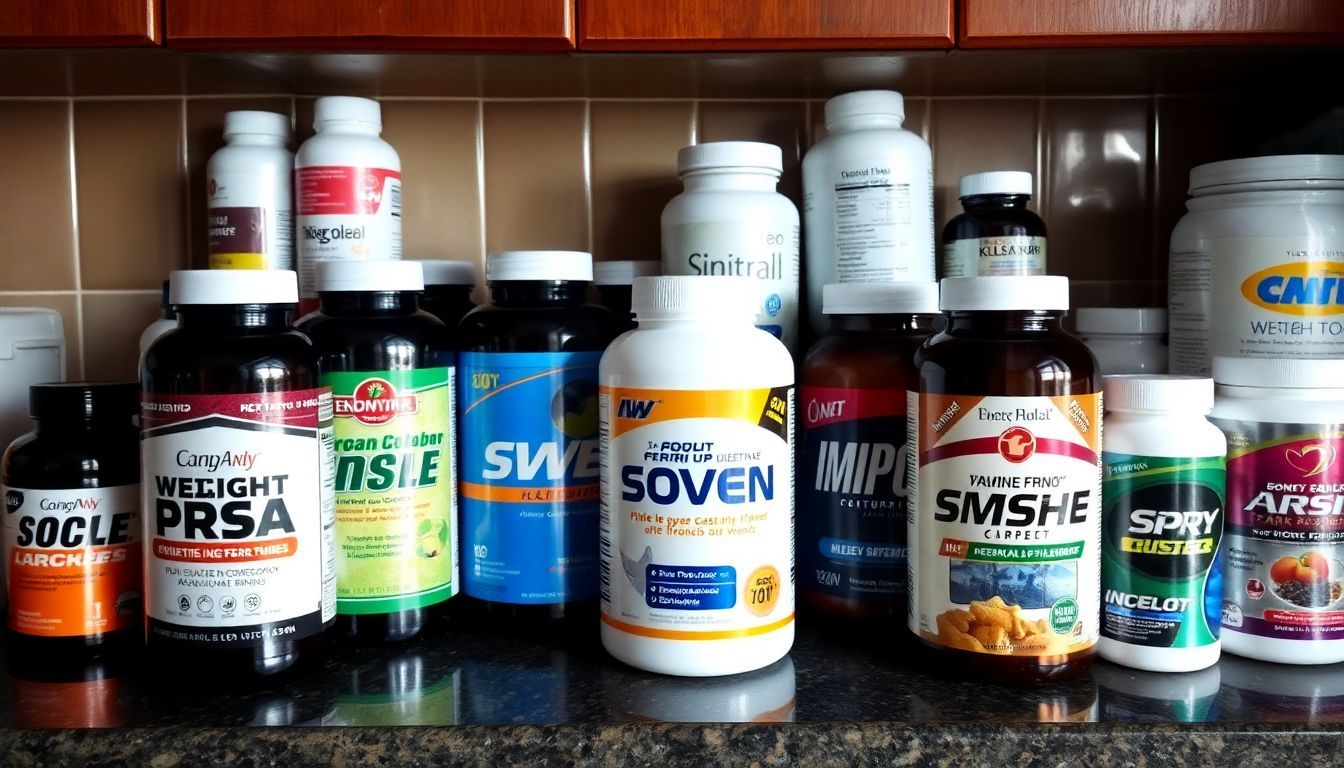Losing weight or building muscle can feel overwhelming. Many turn to dietary supplements, hoping for quick results. But these products often carry risks like harmful ingredients or health issues.
Thank you for reading this post, don't forget to subscribe!Keep reading to learn how to protect yourself and make better choices.
Key Takeaways
- Many weight loss and sports supplements have hidden risks, including harmful ingredients like heavy metals or banned substances, which can lead to liver damage or heart issues.
- Claims like “quick results” or “build muscle overnight” are often false; consult healthcare professionals before using any dietary supplement for safety.
- Protein powders, fat burners, and amino acid supplements may help some but can also contain toxins or contaminants if not from trusted brands.
- A balanced diet with regular exercise is safer and more effective than relying on risky supplements for health or fitness goals.
Risks Associated with Weight Loss and Sports Supplements
Many weight loss and sports supplements contain unregulated ingredients. These products can lead to serious health problems, including liver damage or heart issues.
Potential harm from unregulated ingredients
Some dietary supplements may contain harmful, unregulated ingredients. These products can include contaminants like heavy metals or dangerous chemicals that put public health at risk.
For instance, some weight loss and sports supplements have been linked to severe liver damage and other health problems due to undisclosed substances. Without proper regulation, companies might add unsafe additives that aren’t listed on the label.
Reports also show cases of severe medical events caused by such ingredients in energy supplements and fat burners. Harvard T.H. Chan School of Public Health warns about these dangers because lack of oversight leaves consumers vulnerable to toxins or banned substances.
Contaminated products could harm your body—affecting muscles, insulin levels, blood glucose response, or even hormone balance over time.
Unregulated does not mean safe—it often means risky.
Variation in effectiveness among individuals
Unregulated ingredients in supplements can cause unexpected risks, but their effectiveness also varies greatly. Personal factors like age, weight, and metabolism play a big role. A supplement that helps one person build muscle or lose weight might do nothing—or even harm—another.
Athletic enhancement products may not work the same for everyone. For instance, creatine monohydrate aids muscle growth for some during resistance training but shows little effect in others.
The body’s ability to absorb nutrients or react to ingredients differs between people. This makes it crucial to approach sports supplements carefully and cautiously before use.
Warnings about harmful ingredients and contaminants
Not all supplements are safe. Some products contain contaminants like heavy metals, banned drugs, or unsafe herbs that can lead to severe medical events.
Unregulated ingredients may cause liver damage, kidney issues, or even heart disease. These risks put public health at stake.
Labels don’t always tell the whole truth. Supplements claiming magical results might hide toxic chemicals or unapproved medications. For example, some pre-workout supplements include high doses of caffeine powder, which can be dangerous when consumed excessively.
Mislabeling makes it hard for consumers to know what they’re really taking—leaving them vulnerable to serious health risks from unsafe products in the supplement industry.
Considerations for Consumers
Be cautious of exaggerated claims about quick fixes or results. Always talk to a doctor before using any supplement for sports or weight loss.
Caution against claims that sound too good to be true
Many weight loss and sports supplements promise quick results. Claims like “lose 20 pounds in a week” or “build muscle overnight” are red flags. These promises often lack proof or rely on exaggerated marketing tactics.
For example, some fat burners claim to melt body fat without exercise—this is not supported by science.
Products with flashy advertisements may also hide risks like liver damage or harmful ingredients. Always check if scientific evidence supports the claims before use. Next, explore why consulting healthcare professionals matters for safety and better choices….
Importance of consulting healthcare professionals
Consult healthcare professionals before taking any dietary supplements. Some products have harmful ingredients or unknown contaminants that could cause liver damage or other severe medical events.
They can also interact poorly with prescription medications, leading to health risks.
Experts provide personal advice based on your needs and goals. They ensure supplements are safe and effective for you, especially if combined with a keto diet, low-carb diets, or physical activity like weight training.
Make safety a priority—talk to a trusted professional first.

Commonly Used Supplements and Potential Risks
Many supplements promise quick results but may carry hidden risks. Some can harm the liver, kidneys, or even muscle health if used carelessly.
Protein powders
Protein powders are popular among athletes and fitness enthusiasts. They help with muscle building, recovery, and weight management. Whey protein is a common choice due to its high-quality amino acids.
Plant-based options like soy or pea protein work well for people avoiding dairy.
Some powders have risks, though. Contaminants like heavy metals can be harmful if consumed over time. Poor-quality products may also contain hidden additives that hurt your health.
Always choose trusted brands tested for safety and purity to avoid issues such as liver damage or unwanted side effects.
Fat burners
Protein powders may assist with muscle building, but fat burners target weight loss. These supplements promise quick results by boosting metabolism or burning calories faster. Many include caffeine, green tea extract, or other stimulants.
Some fat burners contain unregulated ingredients that pose health risks. Cases of liver damage and severe medical events have been reported. Always approach these products cautiously—especially those claiming dramatic weight-loss effects without effort.
Amino acids
Amino acids play a big role in muscle recovery and growth. These building blocks of protein help repair damaged muscle fibers after workouts. Many sports supplements include branched-chain amino acids (BCAAs) like leucine, isoleucine, and valine—common choices for weight lifters or those on low-carbohydrate diets.
Improper use can lead to side effects like nausea or fatigue. Some products may also lack proper quality checks, increasing health risks such as contamination with heavy metals. Always check labels and consult healthcare professionals before using any amino acid supplement for safety and dosage advice.
Regulation in the Supplement Industry
The supplement industry lacks strict oversight. Many products may carry health risks or misleading claims.
Necessity for protection against misleading claims and unsafe products
Misleading marketing can trick people into unsafe choices. Many dietary supplements lack strict regulation, leaving room for false claims and hidden dangers. Some products promise quick weight loss or enhanced sports performance but contain harmful ingredients like heavy metals or banned substances.
Proper industry standards help ensure public health is not at risk. These rules protect consumers from liver damage, severe medical events, and other health risks linked to poor-quality supplements.
Clear guidelines make it harder for companies to sell unsafe or ineffective items.
Emphasis on Balanced Diet and Exercise
Eating nutrient-rich foods and staying active help build a strong, healthy body. Pairing movement with good meals can improve energy, strength, and focus over time.
Foundational elements for health and fitness goals
A balanced diet and regular exercise build the base for lasting health. Whole foods—like fruits, vegetables, lean meats, and high-fiber grains—fuel your body. Low carbohydrate diets or plant-based options suit some people but may not fit all.
Consuming less saturated fat while boosting omega-3 fatty acids improves heart health.
Strength exercises, such as weight lifting or interval training, help build muscle and improve fitness levels. High-intensity interval training burns calories quickly and strengthens endurance.
Staying active through daily movement supports skeletal muscles while maintaining healthy glycogen stores for energy during workouts.
Conclusion
Weight loss and sports supplements can be risky. Some contain harmful ingredients or unsafe levels of contaminants. It’s best to rely on trusted advice, like Harvard Health insights, and avoid products with bold but unproven claims.
Focus on healthy eating, regular exercise, and professional guidance instead of quick fixes. Your health matters most—choose wisely!
